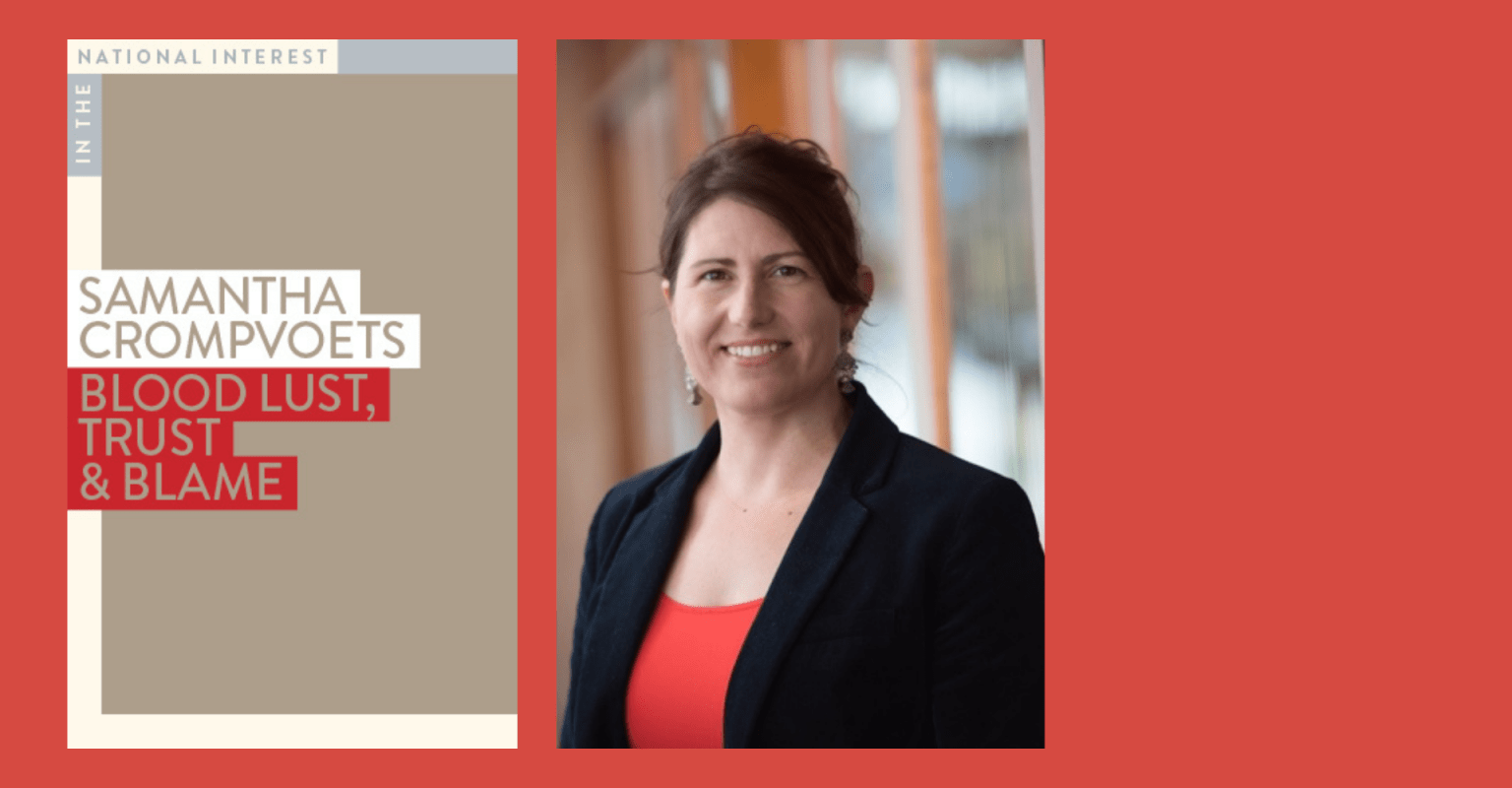
Dr Samantha Crompvoets is best known as the government consultant who first reported on war crimes allegedly perpetrated by members of the Australian Special Forces in Afghanistan. While today Samantha runs a consulting company specialising in applied social science research, she began her academic career as an Honours student in the History & Philosophy of Science (HPS) program at the University of Melbourne.
In this interview with current HPS PhD candidate Samara Greenwood, Samantha reveals how her initial grounding in HPS studies has been vital for her later work, how her consulting research work differs from traditional academic research and the distinct approach she takes to promoting real change in flawed organisational structures, such as those found in some areas of the special forces.
You run your own research consultancy company, yet your academic life began in History and Philosophy of Science. Do you see those two worlds as connected in any way?
Even though the work I do now is far more corporate and organisational, the way I question and analyse problems is absolutely informed by what I learned in my HPS undergraduate degree. HPS encouraged a particular form of critical questioning that set me up for my entire career.
I’ve always found it difficult to describe myself. Although now I say I am a sociologist because people sort of understand what that means, my intellectual mindset is really HPS. I look at everything through the lens of HPS.
When I received the certificate for my degree, there was a typo. It says my honours was in history and philosophy and science, not of science. Even though that was twenty-plus years ago, I often still think I should get that typo fixed! HPS is the love of my life.
How did you first become interested in the field of History and Philosophy of Science?
I went to Melbourne University to become a vet. But to do Veterinary Science, you first had to do a year of Science.
I had worked hard in Year 12 but, in my first year at University, I lived at college and didn’t work at all. I almost failed everything, which was a shock to the system. I also realised I didn’t really love science. In fact, in Year 12 my best marks were in English and Literature. That’s what I loved doing, writing and research.
So here I was, at the end of my first year, failing everything, knowing science wasn’t for me, but not sure what to do.
It was a conversation with one of the Jesuit priests at Newman College, who was also a physicist, that helped. He suggested I might enjoy History and Philosophy of Science but I didn’t even know what it was! I then did a few subjects and absolutely fell in love with the field. It transformed my life. By the time I got to Honours I had done all the HPS subjects on offer.
Even today, I have books from my HPS subjects that I still reference. I love the language and the discussions and that fascinating intersection of philosophy, science and sociology.
Were there any people, books, or ideas you found particularly compelling?
The first subject I ever did was called something like The Social History of AIDS. It was very in depth and really shaped my thinking. Then I did another subject with Dr Rosemary Robins and we spent the whole semester analysing the book Reflexive Modernization by Ulrich Beck, Anthony Giddens and Scott Lash. We took the book apart chapter by chapter and it was incredibly stimulating. I remember years later meeting Beck at a conference and it was like meeting an academic rock star!
Most of all HPS and the academic women I met inspired my interest in qualitative research. My honours supervisor was Professor Marilys Guillemin, and she was incredible. After I finished honours, I received a summer scholarship to ANU where Dr Anni Dugdale was my supervisor and became a lifelong friend. I was surrounded by these incredible academic women; I still get excited just thinking about it.
How did you go from Honours in HPS to a forming your own research consulting firm?
I completed my PhD at ANU’s National Centre for Epidemiology and Population Health on women’s experience with breast cancer. In my PhD I critiqued the ‘look good, feel better’ programs directed toward women with breast cancer and the influence of cosmetic surgery and prosthesis companies. I was interested in applied research, and I went to the centre because my main supervisor, Emeritus Professor Dorothy Broom, was an incredible academic involved in women’s health.
In the four years it took me to do my PhD I had three children, which was kind of crazy. After that I worked at the medical school at ANU. Being in Canberra, there were lots of opportunities to do research for different government agencies. I was asked to do some research for the Department of Veterans Affairs [DVA], studying women who deployed and why the DVA policy framework didn’t accommodate women’s health needs. It was a three-year project, with a grant of around $300,000.
I was very excited but there was a steep learning curve as it took eight or nine months for the contract to be signed between the University and the DVA. There was a fight over who would own the intellectual property. After the contract was finally signed, I worked hard on the project and it ended up a seminal piece of work for veterans’ affairs. It changed policy and made a real impact.
I was then taken aback when the university told me it wouldn’t count toward promotion as it was ‘contract research’. I’d spent three years interviewing women who deployed from Vietnam right through Afghanistan, I had met with the defence minister and made real change, but that didn’t seem to matter. I was told that because I hadn’t published enough research papers or travelled to international conferences, the research wasn’t highly valued. When I asked about the funding I had brought to the university I was told it was ‘low-value money’.
Here I was, a single mum with three little kids who had pulled off this amazing project and I was being told my research and my money was ‘low-value’.
I then got offered another big project, except this time it was for half a million dollars for 18 months work. I thought, F–it, I’ll do it as a consultant. I need to pay my mortgage and the bank doesn’t judge my money as ‘low-value’. I did that project through ANU’s consulting arm, but they took a large percentage off the top without really offering me much in return.
I then decided I was better off starting my own firm. It was much more agile. There wasn’t months and months of contract negotiations, I could more freely write policy papers and I could employ my own staff. It made so much more sense. It also meant I could move from being paid $200 a day as a Level B academic to $2000 a day as the head of my own firm. So, I left ANU and hired every incredible academic woman I knew who had recently had a baby or had left academia. I said to them, come work for me and I’ll pay you double.
We loved it. We got to create our own business and, in a sense, make up our own rules. For example, we asked, why do we only have four weeks leave a year? Let’s have unlimited leave. It was a wonderful experience.
That’s how I ended up spending the last eight years building and running a business that involves applied social science research. I describe it as ‘research on steroids’. We can quickly assemble a team of awesome researchers and complete a project in 3 months that would normally take two years in academia. We have now built a reputation for doing high quality research, fast.
How does your research work differ from academic research?
It’s a different way of analysing research as we have a very specific purpose. In academia you often do more exploratory research. Instead, we typically need to answer a particular policy problem.
We also feel incredibly valued. Often, as a PhD researcher, you feel you know a lot about one subject, but you wonder: who really cares? In our consulting we find people can’t believe how well we ask questions and analyse problems. I respond – this is what we are taught as academic researchers in HPS and in social sciences, this is what we learn, this is what we do. It is great to have such a highly valued skillset in the government context.
For example, we did research on domestic violence in the defence force. We did huge work interviewing people, trying to understand the extent of domestic violence. We then wrote suggestions for what a domestic violence policy and response framework could look like, and they implemented it. That’s a reward you don’t necessarily get from having your article published in a star journal, when you aren’t sure whether the right people have read it, or whether it has landed where you want it to land.
I love that we can do this research, that we can write a paper and hand it to someone who then reads it and acts on it. We get to help change policies and be thanked for it. It is so rewarding.
We’ve found this whole other economy for research. I think there needs to be more pathways into this kind of work for social scientists. In eight years of running my business, I was getting at least one CV a week from social scientists asking if I had any job openings. They were yearning for well paid, applied social science work where you feel valued.
How did this kind of research help you uncover problems within the special forces?
People often ask, how do you get people to open up about difficult issues? It’s because of the skills I’ve learnt in qualitative interviewing. I have been trained in building rapport in a few minutes, in critical questioning, in manoeuvring the conversation and doing analysis as I go. From the outside it may look like just a conversation, but it is far more than that – there is significant expertise involved.
In working with special forces, through qualitative interviewing, I knew there was something really wrong. While I was there to investigate a different issue, I could see there was something important there. Because I had trusted relations with those in charge, with the Chief of Army and the Chief of Defence Force, I could tell them it seemed something really wrong had happened and they responded, ‘write it up’. So, I reported what I was finding, and it became very clear there were possible war crimes.
In your book on your work with the ADF, Blood Lust, Trust and Blame, you wrote that to meaningfully respond to such problems we need to look beyond a general concern about cultural change toward a more specific focus on social networks, power relations and the role of impactful micro-changes. I’m interested in what led you to this way of thinking.
I have spent ten years working with big organisations and with massive scandals that often end up on the front page. There is a lot of public and political pressure to fix these kinds of problems. The standard response is to spend millions of dollars on consultants and talk in a very large-scale, general way about ‘cultural values’ and ‘cultural change’. What I’ve found is that no one is trying to really understand why the problem happened in the first place or even why all this money is spent on ‘culture change work’ when things don’t actually change. They haven’t really mapped out the barriers to change.
For example, when we were researching why women in defence weren’t able to progress their careers as they would wish, we found it was because it was illegal to work part time. Defence had developed a strange work-around for the law but the stigma of working part time remained.
Before we came along, they had spent close to a hundred million dollars on cultural issues and communications plans. We then came in on a small project and realised they just needed to ask questions differently. We provided evidence for some small changes that would actually create a larger shift. Our work ended up changing legislation, which had a significant impact on working lives, but it wasn’t deemed worthy of a big political announcement. Instead, the announcement was how the defence force had now got their six cultural values correctly worded! From my experience, problematic behaviours just aren’t influenced like that.
In the special forces case, the problem wasn’t with the values of the army in general – it was about an elite group of hyper-masculine men being given the keys to the world. Similar problems happen in pockets of many institutions where there are small, elite groups with no rules, lots of secrecy and lots of autonomy.
To fix these problematic structures we don’t need lots of money thrown at shifting cultural values, but rather focused, impactful, micro changes. When we do the deep analysis to find where the issues are, we often find that if we change this structure, or this pathway of career development, then everything else can change because of that small shift. That micro-change forces larger change. It may not be politically sexy, but the research backs it up and it works.
Dr Samantha Crompvoets has conducted extensive empirical research on a number of military cohorts, for both the Department of Veterans’ Affairs and the Department of Defence, including reservists, women, special forces, Indigenous soldiers, and veterans. Dr Crompvoets is a member of the NATO SAS-144 panel developing the Code of Best Practice for Conducting Survey Research in a Military Context. She is Chair of the Australian Centre for Excellence in Post-Traumatic Stress and sits on a number of advisory boards across the defence and security sector. She consults through the company she founded, Rapid Context, and her most recent publication is Blood Lust, Trust and Blame, part of the In the National Interest series by Monash University Publishing.





